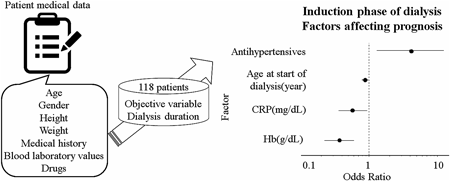- 著者
- Kousuke Nishikiori Kentaro Tanaka Takashi Ozawa Yoshihiro Uesawa
- 出版者
- The Pharmaceutical Society of Japan
- 雑誌
- Biological and Pharmaceutical Bulletin (ISSN:09186158)
- 巻号頁・発行日
- vol.46, no.1, pp.19-25, 2023-01-01 (Released:2023-01-01)
- 参考文献数
- 29
Various factors affect the prognosis of dialysis patients. Analysis of the drugs used and clinical and demographic characteristics of the patient at the time of dialysis initiation is a useful means of estimating prognosis. In this study, we investigated the drugs used by dialysis patients during the induction phase of dialysis and performed a detailed analysis of variables predictive of prognosis. Patients who underwent dialysis between June 1998 and January 2019 and died during this period were included in the study (n = 118). The induction phase of dialysis was defined as the first month after dialysis began. Dialysis duration was defined as the time between dialysis initiation and death. A univariate regression analysis was performed, with dialysis duration as the objective variable and the drugs used during the induction phase of dialysis, blood laboratory values, age at start of dialysis, sex, body height, body weight, medical history and cause of death as the explanatory variables. In addition, multiple logistic regression analysis with stepwise variable selection of significant factors was performed to determine the factors related to dialysis duration. Antihypertensives, hemoglobin (Hb), and age at start of dialysis were found to have significant effects on dialysis duration. It was posited that antihypertensives prolong dialysis duration, thereby improving life expectancy. The regression model developed allowed estimation of prognosis based on the drugs used during the induction phase of dialysis and patient characteristics. These findings may be used to improve drug adherence in dialysis patients and guide physicians in their treatment.
